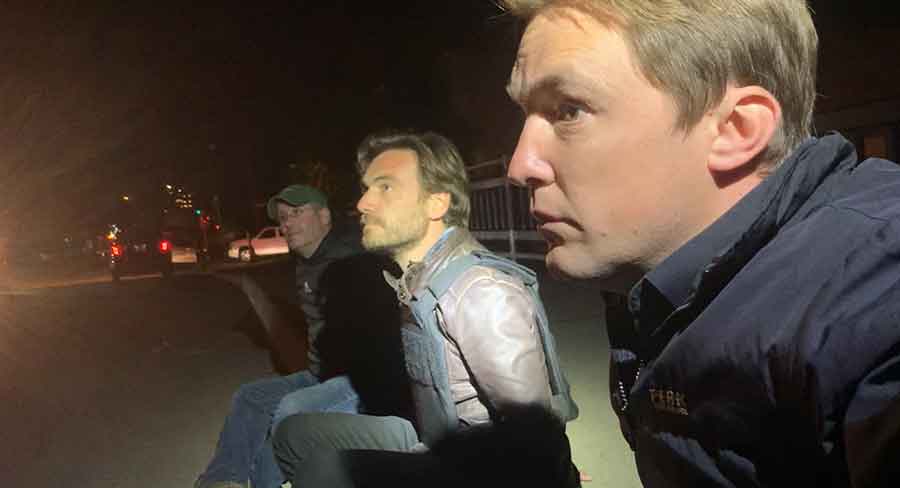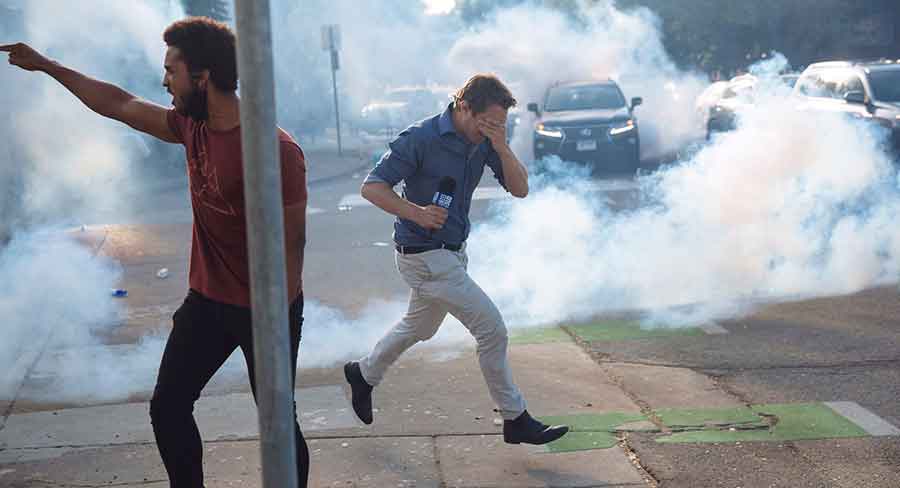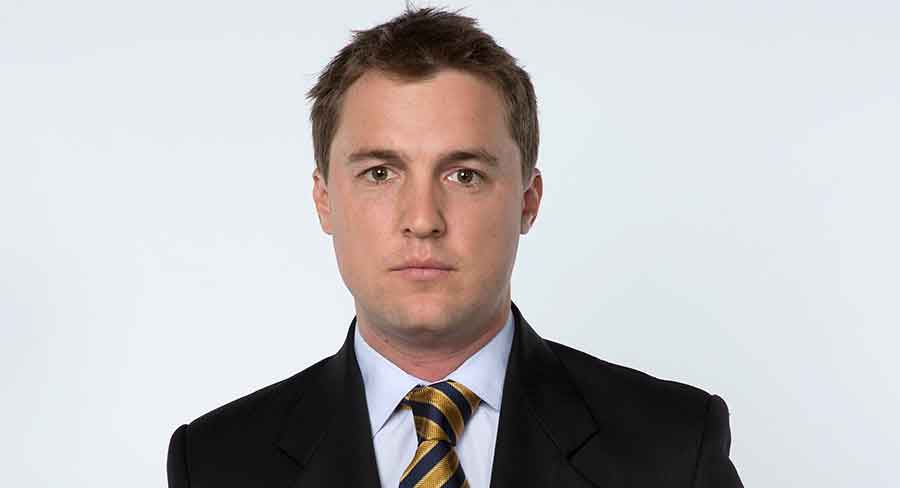The Queensland Clarion Awards celebrate quality journalism and reward media professionals whose commitment to excellence in media coverage best informs and entertains Queenslanders. The big winner in 2020 was Nine‘s US correspondent Tim Arvier who claimed three awards on the night for Broadcast Interview, TV News Report, and Journalist of the Year 2020.
The awards were in recognition of his journalism in the United States this year, in particular his live cross from the heart of the riots in Minneapolis. The 17 minutes of live television brought Australian lounge rooms the reality of what was unfolding on the streets of America.
Arvier and his camera operator Adam Bovino worked through bricks being thrown and tear gas fired all around them. Behind the scenes of the 17-minute live cross, Arvier spent time on the front line of the riots where he negotiated roadblocks, risked arrest and at one point was detained at gunpoint by police.

After his success at the Clarion Awards and covering some of the biggest US news stories of the last 10 years in a matter of months, Arvier spoke to Mediaweek about his wild 2020.
Winning big at the Clarion Awards
Arvier said that he was made aware of his Journalist of the Year win a tad early when he was asked to film an acceptance speech a few days beforehand. He was fast asleep when the award was announced describing it as a very odd way to experience an awards night.
“I actually thought my colleagues might have been prank calling and then realised it might actually be real.
“After sending through the acceptance video a few days earlier I started getting messages in the very early hours of the Los Angeles morning and replied to a few and then went back to bed.
“I assume the award is somewhere in the Queensland office for me when I get back in the new year and I hope it is not lost in the back of a taxi somewhere.”
When asked about how he felt about winning the award Arvier said that it is a funny feeling.
“I tend to think of awards nights as a really nice restaurant menu, what wins depends on the judge’s tastes on the night. Sometimes you think you have a really good chance and don’t win and other times you win more than you originally expected. It’s nice to be recognised and you never take anything for granted at those awards nights because there were some amazing entries like David Murray’s The Lighthouse podcast.
“I had a look back at some of the people who have won the award before and they are some of Queensland’s best journos, so it was really nice to be able to be on a list with those people.”
Arvier was glad that his cameraman Adam Bovino also got recognition for his work by winning a Walkley, acknowledging that he had it much harder than himself down on the ground.
“The work he did was amazing, the skin was rubbed off his shoulder after hours of live crosses and he still shot amazing pictures while getting tear-gassed for days on end.”
Working in the United States during 2020

Arvier admits he hasn’t had much time to think about winning the Clarion Award due to being stationed in the US during such a frantic period in the news cycle with an impeachment trial, pandemic and an election just a few of the major stories.
“Ever since March/April it has just been absolutely non-stop, and the stories just keep going and going and you never really stop to think about anything for long.
“Something like Donald Trump’s tax return in an election year normally would be a massive story but six hours later we had all moved on to something else.”
Working on the other side of the world and producing content for Australian audiences means that Arvier works an interesting schedule.
“My down time is when Australia is sleeping in the mid-morning, and the day gets busy when the Today show starts which is 1pm my time (in LA). It is pretty busy throughout the rest of the day and by dinner time events have died down and I can write my script for the 6pm story on Nine News.”
Arvier has experienced something not many journalists get to do during their careers, he has been a frequent visitor to the White House for press briefings and has done so in a pivotal time in US history.
“I was here for a large part of April and when people look back at that period it may be looked at as when Trump burnt his presidency down.”
Arvier said one of the main highlights was getting to ask the President a question in the Rose Garden.
“It is rare for someone in the foreign press to get in there and ask a question. It is all a bit of a lottery and is about trying to catch Donald Trump’s eye. He likes to be the centre of attention, so I paid him a lot of attention and looked at him and I got to ask the last question, he didn’t answer it, but I got to ask it.”
During his time in the states, Arvier said that a lot has changed since he started going to the White House.
“My first visit was for the impeachment story, which I thought was going to be one of the biggest of the year and now everyone has forgotten about it.”
“The White House has changed a lot – at the beginning of the briefings there was social distancing and reduced numbers, but no one was wearing masks and then it was tightened up a bit, but now it is going back the other way again.”
Arvier described the US election as a non-stop and insane week, which would have been a lot easier if someone conceded.
“We did our first live cross on election day at 4:30am in Florida. We had an official Trump event to go to and stayed up for 24 hours and did our next live cross at the start of the State of Origin coverage.
“We then got straight back into our car and drove to the airport and had a 45-minute sleep, got on a flight to Philadelphia and slept for about another hour, then straight back into rolling coverage again. It just kept on going and going.”
When asked the difference between covering news in Australia and the US, Arvier told Mediaweek that the two key differences were the hunger for political news and the freedom of the press.
“For all the fake news and antipathy to the news that Donald Trump has whipped up, there is still an incredible appetite for political news, more than in Australia. Donald Trump has driven a large part of that and it is also far easier to work as a journalist over here in America than it is in Australia.
“In Australia, we are much more restrictive with the freedom of the press than in the States. I am not looking forward to moving back to Queensland because there is a government that is not very welcoming to the press at all and has sought to restrain press freedom, and the federal government doesn’t have a great track record with it either.”
